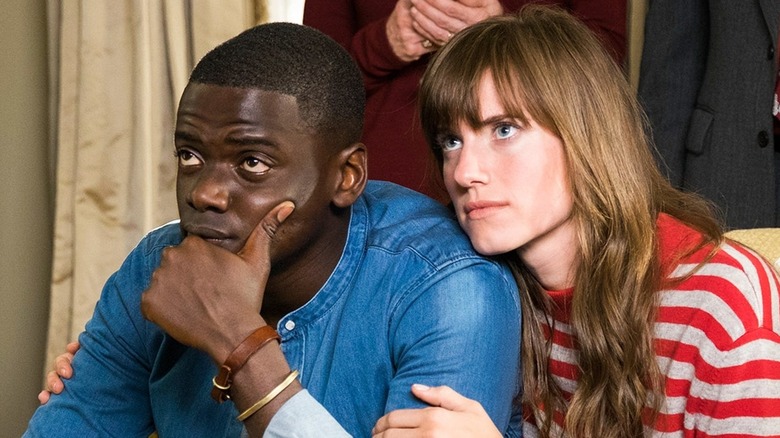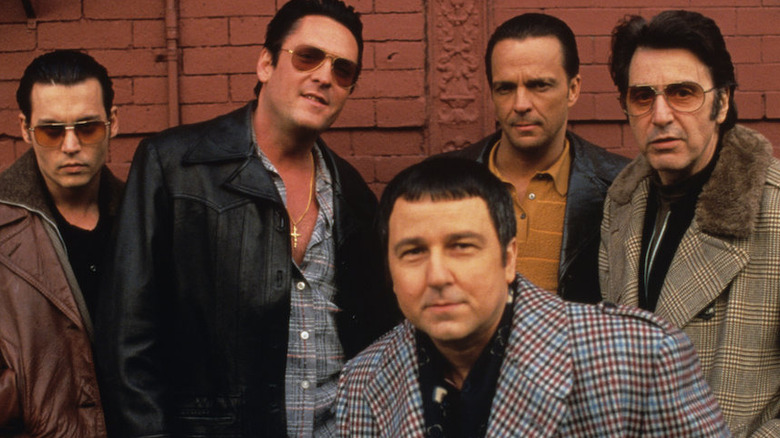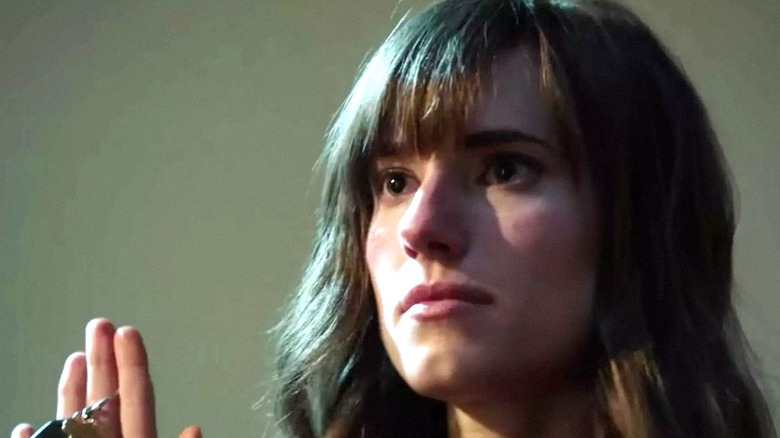Get Out's Climactic Scene Was Inspired By An Al Pacino Performance
Jordan Peele's feature directorial debut "Get Out" has garnered critical acclaim (and quite a few awards) for its blend of horror and social commentary. But make no mistake: this is a terrifying movie. The opening sequence helps set the stage for what's to come; Andre (LaKeith Stanfield) is walking down the street when suddenly he's abducted by a frightening figure wearing a knight's helmet.
Then there's the infamous Sunken Place, which features Chris Williams (Daniel Kaluuya) falling through a seemingly endless void after being hypnotized by his girlfriend Rose's (Allison Williams) mother, Missy Armitage (Catherine Keener). But the biggest shock comes when Chris attempts to leave: Rose reveals that she has been working with her family to abduct multiple Black men and women — and Chris is their latest victim.
The scene is a masterclass in tension, as Dean (Bradley Whitford) starts pontificating about how his family has ascended into "godhood." It builds steadily until Rose flips on a dime from a pantomime of searching for her keys to an utterly cold expression as she tells Chris, "You know I can't give you the keys, right, babe?"
Though it might not be the most obvious inspiration for "Get Out" that comes to mind, writer/director Jordan Peele revealed in an interview that the Al Pacino/Johnny Depp film "Donnie Brasco" helped him to shape this scene — in particular, the psychological stalemate between Chris and Rose.
Under pressure
Peele told Entertainment Weekly that he was inspired by watching the scene in "Donnie Brasco" where Johnny Depp's Joe Pistone, who's gone undercover as the titular Donnie Brasco, is cornered by Al Pacino's Lefty Ruggerio. That pressure cooker of a scene contained the energy that Peele was searching for — both from Kaluuya, and for what this scene meant for the film's climax:
"And Pacino looks at him, he's holding his gun to Johnny Depp, and Depp's like, 'What are you doing?' and Pacino says, 'If you're a rat,' and he points the gun toward his own head. And it's this moment that's very powerful to me because it was a moment where it's like, 'I know what you did and you're going to have to say what you've done, but my emotion and my rage is going to be clear in this performance.' We did it several times and it was only the last take that he approached nearly that level of raw emotion."
Kaluuya indeed delivers a firecracker performance in this scene, growing more and more tense to the point where he finally snaps. But what makes the scene really work is that the audience is right there with him. The suspense builds as Rose pretends to (inefficiently) search for the keys, and despite all the bad omens there's still a vain, fading hope that perhaps Chris still has an ally in the house ... making Rose's casual heel turn all the more devastating. Not only is Chris' fury and frustration justified, but it also turns out to be the necessary fuel to power his escape later in the film.
Stalemate
Of course, Kaluuya was only one part of the equation. Peele knew that he needed to build up to that explosive moment of Rose finally admitting her betrayal — and sustaining that tension led to the scene being the most difficult thing he shot:
"It was very hard for me to put into words exactly why we were going to be able to reveal this twist twice in a matter of four minutes. But I knew it would work, and I knew after the pictures [of Rose's previous victims] happened up until the keys moment that we would be in a state of limbo where everyone involved is pretending that they don't know what's going on, but everyone knows what's going on and everybody knows that everybody knows what's going on."
That same sense of tension would permeate Peele's sophomore film "Us," in which the red-suited Tethered don't appear until nearly halfway in the film. When they first appear, they don't say anything — and then they suddenly bolt into the shadows, reappearing to corner and torment their victims. Peele knows the value of sustaining tension to build up to a good scare, and that bodes well for his upcoming film, "Nope "– whose trailer teased even more of the filmmaker's trademark mystery and suspense.


